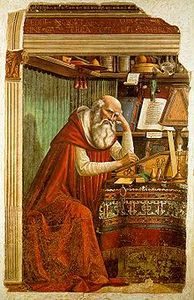 Saint Jerome Patron saint of Literature
Saint Jerome Patron saint of Literature The following quote is poetry explained like only a poet can, by Tracy W. Smith, the winner of the 2012 Pulitzer prize for her book of poems, Life on Mars. She says, "For me a poem is an opportunity to kind of interrogate myself a little bit and see what ways I'm complicated by situations or even... I don't know... like somehow connected to in ways that might be uncomfortable. " Here, Smith also alludes to poetry as a platform for demystifying difficult discourses.
My love and appreciation for the creative arts is surpassed only by my love for the Master Creator, our awesome God. My love affair with men and women who had their way with words begins with my grandfather Ivan (my mom's stories of his wit and sarcasm made me yearn to have sat at his feet). Then there was my high school English Literature teacher who we affectionately called Aunt Beryl. It was she who whet my appetite for the rhythm and rhyme of the written word, encouraged me to lend an attentive ear to Shakespeare, and who nurtured my impulse to dabble in the writer's inkpot.
Then on my own I discovered Maya Angelou. I found myself longing for the opportunity to sit at her hearthstone and listen to her heart speak just so her gift of words would somehow seep surreptitiously into my bones.
In college I stumbled upon Zora Hurston from whom I've often and unabashedly so, stolen the phrase, "I've been in sorrow's kitchen and licked out all the kitchen pots" in my attempts to put a name to pain.
And then like an unfaithful lover, I might then turn and seek comfort in the arms of Kahlil Gibran's truth. When you wrestle with the idea of death and dying of a loved one and your hurt collides with Gibran"s enlightened soliloquys one cannot help but find solace and renewal of spirit. Gibran writes;
"Only when you drink from the river of silence shall you indeed sing. And when you have reached the mountain top, then you shall begin to climb. And when the earth shall claim your limbs, then shall you
truly dance"
At other times when I seek to interpret and interrogate social injustice issues of hunger, genocide and poverty, I resort to the words of the brilliant, Ben Okri. In his poem, An African Elegy, he writes about the audacity of hope amidst pain and struggle:
We are the miracles that God made
To taste the bitter fruit of Time.
We are precious.
And one day our suffering
Will turn into the wonders of the earth.
Life's meanderings inevitably leads to the subject of Love. At such a juncture one must for a time make acquaintances with the mistress who so masterfully orchestrates the ode to love's seedier side. Enter stage left, Ms. Elizabeth Smart who weeps for her lover by Grand Central Station, ere joining the ranks of the children of Israel who wept by the rivers of the Babylon when they remembered Zion.
Though the theological debate rages, much of the Bible IS a study in prose and poetry. The lyrical expressions of joy, sorrow, praise and penitence of David; the mournful dirges of lamentations; the Love Songs of Solomon which accurately suggests that, "many waters cannot quench love nor can the floods drown it"
Then there are those awesome literary exchanges between Job and God. One must remember that God is aka, The Word so Job could not really compete in that poetry slam. Here's a snippet of their conversations. God speaking:
"Where were you when I laid the earth’s foundation?
Tell me, if you understand
Who marked off its dimensions?
Surely you know!
Who stretched a measuring line across it?
On what were its footings set,
or who laid its cornerstone—
while the morning stars sang
together and all the angels shouted for joy?"
Job 38
No wonder His son Jesus also had a way with words and loved to speak in Parables (spiritual truths embedded in earthly prose). Jesus' communication style helps us to stretch our thinking and consider His message of Salvation. In the following parable He reminds us to shine for his Glory in the Parable of the lamp under a bushel (Matthew 5:14- 16 NIV)
You are the light of the world. A town built on a hill cannot be hidden.
Neither do people light a lamp and put it under a bowl.
Instead they put it on its stand, and it gives light to everyone in the house.
In the same way, let your light shine before others,
that they may see your good deeds and glorify your Father in heaven.
So even as we celebrate a Month of Poetry
let's gather and reason
about the Master Poet for all the seasons
of our lives
let our christian fire burn brightly
A reflection of His great Glory.
Love and Blessings
Zpora
